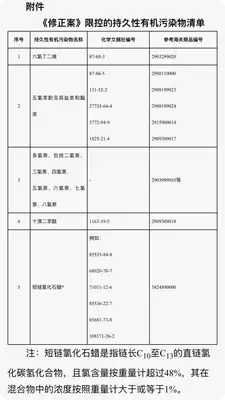- Shanghai Zhongshen International Trade Co., Ltd. - Two decades of trade agency expertise.
- Service Hotline: 139 1787 2118
The Standing Committee of the National Peoples Congress of the Peoples Republic of China reviewed and approved the Amendment to the Stockholm Convention on Persistent Organic Pollutants to List Three Types of Persistent Organic Pollutants such as Polychlorinated Naphthalenes and the Amendment to the Stockholm Convention on Persistent Organic Pollutants to List Three Types of Persistent Organic Pollutants such as Short - Chain Chlorinated Paraffins (hereinafter collectively referred to as the Amendment) at its 38th meeting on December 30, 2022. The Amendment will come into force in China from June 6, 2023.
In the Amendment,Hexachlorobutadiene,Polychlorinated Naphthalenes,Pentachlorophenoland its salts and esters,Decabromodiphenyl EtherandShort - Chain Chlorinated ParaffinsThese 5 types of persistent organic pollutants are clearly defined as those that need to be phased out or restricted. Therefore, China hereby announces the following control measures:
First of all, China will ban the production and use ofimport and exportHexachlorobutadiene, Polychlorinated Naphthalenes, Pentachlorophenol and its salts and esters. Secondly, the production, use, import and export of Decabromodiphenyl Ether will also be prohibited, but three types of products, namely flame - retardant textile products (excluding clothing and toys), specific electrical components and building insulation polyurethane foam plastics, can still be used within the exemption period (until December 31, 2023). Similarly, the production, use, import and export of Short - Chain Chlorinated Paraffins will also be prohibited, but within the exemption period (until December 31, 2023), nine types of products such as the rubber industry, leather industry, and lubricant additives can still be used.
In addition, enterprises, institutions and other producers and operators that emit Hexachlorobutadiene and Polychlorinated Naphthalenes should take effective measures to effectively reduce emissions or eliminate emission sources, and encourage the development and application of alternative technologies to prevent the generation and emission of these two pollutants.
Chemicals for laboratory - scale research or used as reference standards, as well as chemicals that occur as unintentional trace pollutants in products and articles, are not subject to the above - mentioned requirements for prohibiting or restricting production, use, import and export.
Departments such as ecological environment, industry and information technology, housing and urban - rural development, agriculture and rural areas, commerce, emergency management, market supervision and administration, disease prevention and control at all levels, as well as customs, should strengthen the supervision and management of the production, use, import and export of the above 5 types of persistent organic pollutants in accordance with the provisions of relevant national laws and regulations. Once any behavior in violation of this announcement is discovered, it will be seriously investigated and punished in accordance with the law.
This announcement shall come into force as of June 6, 2023, demonstrating Chinas serious attitude towards environmental protection and also marking Chinas important position in global environmental cooperation.

Related Recommendations
? 2025. All Rights Reserved. 滬ICP備2023007705號-2  PSB Record: Shanghai No.31011502009912
PSB Record: Shanghai No.31011502009912









